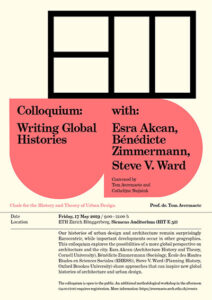 Event: Colloquium Writing Global Histories. Zurich, 17 May 2019
Event: Colloquium Writing Global Histories. Zurich, 17 May 2019
Convened by Tom Avermaete and Cathelijne Nuijsink
This colloquium explores the prospects of a more global perspective on architecture and the city. The dynamic and dense web of connections that binds architectural and urban design efforts across the globe has increasingly become the subject of research, resulting in new historiographies that aim for a cross-cultural and transnational lens. Thus far, these new modes of history writing have typically been understood as corrections of the strong Euro-American focus of current historiographies and of their explicit linking of architectural developments to particular cultures or nation states. This colloquium conversely explores alternative modes of writing cross-cultural and transnational histories, through the use of interdisciplinary approaches and sources. In addition to propelling architectural and urban thinking on the characteristics and effects of globalization, this colloquium aspires to stimulate a discussion on the challenges of ‘global history writing’, both in conceptual and methodological terms.
To initiate the discussion, the conveners have invited three guest speakers to introduce their methodologies using concrete case studies:
Inspired by linguistic translation theories, Esra Akcan (Architecture History and Theory, Cornell University) offers the concept of ‘translation’ as an alternative model to understanding the global circulation of architecture. She captures the interconnectedness of people, capital, ideas, and images, and their transformative capacities when transported from one place to the other. Another response to today’s networked society is her notion of ‘open architecture’ which she defines as the translation of a new ethics of hospitality to the field of architecture.
Sociologist Bénédicte Zimmermann (École des Hautes Etudes en Sciences Sociales (EHESS)) conceives of history as something inherently intertwined and entangled. Together with Michael Werner, she developed the ‘histoire croisée’ (crossed history) approach, which refers to a multi-perspective historiography of transnational history as an alternative to comparative and transfer-oriented modes of history writing.
In the field of planning, Steve V. Ward (Planning History, Oxford Brookes University) developed the theoretical framework of ‘planning diffusion’ to go beyond simple models of import/export. His methodology focusses on the international circulation of planning knowledge and transnational planners to explain how ideas and practices change in their movement as a form of partial reinvention.
The colloquium is open to the public.
In the afternoon (14.00-17:00), a methodological workshop will take place, involving the three invited speakers and the members of the Chair for the History and Theory of Urban Design. A limited number of seats are available for highly interested people who wish to join. To register for this methodological workshop, please contact the Chair at assistenz.avermaete@gta.arch.ethz.ch
Organizer: Chair for the History and Theory of Urban Design (Prof. Avermaete)
Date: Friday, 17 May 2019
Time: 09.00 to 12.00
Location: ETH Zürich, Hönggerberg, Siemens Auditorium (HIL E51)
